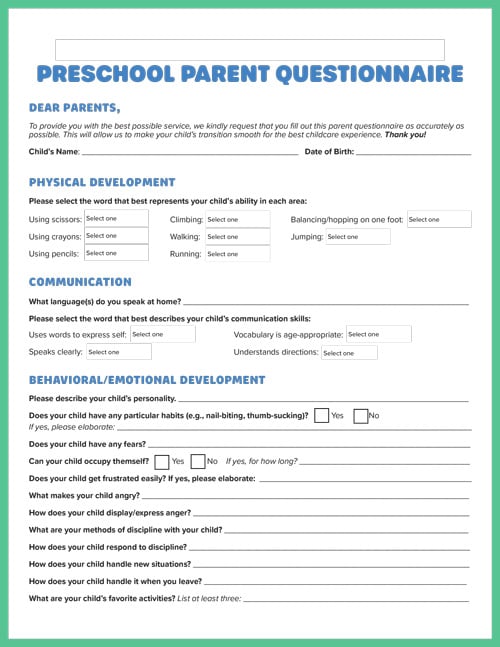To help staff at your preschool meet each child’s social, cultural, physical and learning needs, use a parent questionnaire for preschool to gather this specific information from parents. A parent questionnaire helps families communicate with your school about their children’s likes and dislikes, plus behavioral and developmental issues you can reinforce and work on.
This guide covers five types of questions to ask parents about their children and provides a template for a parent questionnaire that you can adapt specifically to your preschool and programming. Read on to learn more about starting off on the right foot with the families and children in your preschool.
Free Template for a Parent Questionnaire for Preschool
Putting children through preschool is not getting any cheaper, so make sure you're giving the parents entrusting you with their kids the best preschool experience. These daycare letters to parents templates are also a great way to maintain parents' trust.
Every kid is different, so it's imperative to each child's success for the preschool to know where they are developmentally. Providing a comprehensive preschool questionnaire for the parents to fill in at enrollment helps you gather and respond to this important information.
Download our template for a parent questionnaire for preschool that you can edit to suit your needs. All you need to do is click on the image below to access the free editable template.
Download the Free Parent Questionnaire for Preschools!
5 Key Questions Preschools Should Ask Parents
As a guide to our template for a parent questionnaire for preschool, here are five of the most important questions you should ask. These questions help you and your staff nurture the children in your preschool.
1. List Your Child's Natural Strengths
On your parent questionnaire for preschool, ask about each child's strengths. Knowing what they do well offers insight into how they learn best.
Kids will use their natural talents to learn something new. So a good communicator may do best listening to and talking through learning material while a little artist may prefer visual learning.
On the other hand, a child with excellent motor skills may enjoy hands-on learning. Children may take on multiple learning styles, so pay attention to all of their strengths. This can help you group children who learn in similar ways for activities.
Learning a child's strengths also gives you an idea of where you do not need to over teach. If you get a class full of kids who possess a particular strength, you can review or skip particular lessons altogether.
2. List Skills You Want Your Child to Learn
Above all else, parents send their children to school for an education. You should know what parents want their children to learn and make an effort to teach it.
If a number of parents want something specific, then place a bigger focus on that learning objective. If you see an outlier, make time to touch on it during the year.
While your job is to teach the students, it is also important to satisfy their parents because they pay their children's tuition. If somebody requests that their child learn something way above grade level or completely outlandish, reach out to that parent privately about why you cannot meet their request.
3. Describe Your Child's Personality
Answers to this type of question on your parent questionnaire for preschool will give you an idea of who you will teach during childcare. It can help you prepare for all types of children.
Learning who your shy students are will help you encourage them to play with friends. Knowing what students are chatty or act antsy will allow you to seat them away from one another to avoid extra temptations.
Getting to know each child on your own takes time. Their parents' insight can help you from day one.
4. What Language(s) Do You Speak at Home?
Do not assume that all of your students speak English at home. Over 20% of people in this country speak a language other than English with their families.
Some children may speak more than one language fluently. Others may need extra help.
If you don’t ask this on your parent questionnaire for preschool, you may assume that a child is simply quiet or shy when they actually might not understand you. Knowing this prevents kids from falling behind.
5. What Holidays Do You Celebrate?
Culture is an important aspect of life. It drives what we eat, how we dress and the way we socialize.
We celebrate our culture with holidays. Learning what each child's family celebrates allows you to acknowledge their holidays if you recognize other holidays at school.
You can follow up with questions to see if parents are comfortable with children learning about the holidays their peers celebrate. If so, then you can also use your questionnaire to ask families if they are willing to share information about their celebrations to help share their culture with all of your students.
Get 70+ Editable Daycare Templates for Almost Every Situation
 We know daycare providers like yourself are busy. That's why we made dozens of templates to help you manage the various aspects of your organization. From billing and invoicing to marketing materials, we have it all. Download all 70 today!
We know daycare providers like yourself are busy. That's why we made dozens of templates to help you manage the various aspects of your organization. From billing and invoicing to marketing materials, we have it all. Download all 70 today!










